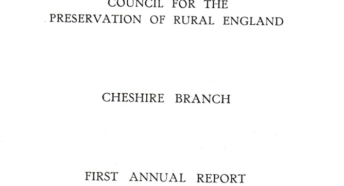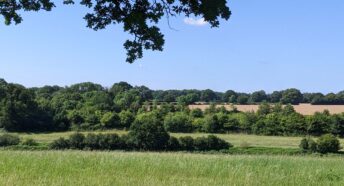Planning to fail: net zero is impossible without urgent changes to planning policy, CPRE analysis finds

Reaching net-zero carbon emissions by 2050 is impossible without urgent changes to national planning policy, analysis by CPRE, the countryside charity, has found.
A study of all 24 Local Plans outside Greater London that have been adopted since the Climate Change Act was updated in 2019 shows just one local authority has introduced a quantified, strategic-level carbon-reduction target.
No other local authority has a Plan to hit net zero. In each case, government planning inspectors have been content to sign off Plans without making tackling the climate emergency a central priority. A study of inspectors’ reports produced before plans are adopted showed an average of only one mention of ‘climate’ for 24 mentions of ‘housing’.
Housing, transport, business and industry generate 62 per cent of our carbon emissions. That is why CPRE is calling for the climate emergency to be urgently put at the heart of planning decisions so we have a realistic chance of hitting net zero by 2050.
For this to happen, the National Planning Policy Framework must be amended so that:
• All new developments demonstrate a measurable reduction in net carbon emissions over the life of the development
• All Plans demonstrate how they will deliver a reduction in private car mileage
• Any plans to boost housing and employment must also be justified on the basis of the additional carbon reductions they will deliver
• All councils must have their net-zero carbon target integrated across the Local Plan as a whole, and this should be an additional test of soundness at examination.
Planning inspectors must give as much weight to environmental targets as they do housebuilding targets. Yet national planning policy has failed to keep up with climate-change legislation, leaving ambitious carbon-reduction targets impossible to achieve.
CPRE’s research shows how national planning policy sets detailed and specific housebuilding targets, with planning inspectors regularly requiring changes to local authority plans that fall short. Conversely, climate targets are generalised, subjective and hard to enforce, with no evidence that inspectors find fault with plans on environmental grounds.
Commenting on the research, Crispin Truman, chief executive of CPRE, said:
“We’re not going to hit net zero by accident – we need to plan for it. Unfortunately, local authorities are hamstrung by national planning policy that is woefully behind the times on this issue.
“Local Plans need to act like road maps plotting the path towards the sustainable future envisaged by the government’s climate-change legislation. The fact that they don’t come close to doing so is proof of the failure of current national planning policy.
“In terms of climate, we are planning to fail. It is impossible to hit net zero if it isn’t prioritised in Local Plans. Providing the attractive, affordable homes that people need and ensuring it is environmentally sustainable is not an either/or trade-off. We need to do both at the same time and with the same level of commitment.
“Worryingly, CPRE’s research has found clear-cut evidence that planning inspectors routinely force local authorities to adopt housebuilding targets with no attempt to reduce greenhouse-gas emissions. Worse still, there is no evidence of any serious effort to reduce car journeys – new developments are frequently planned on the edges of towns with no requirements to provide better public transport or cycle lanes to reduce road journeys.
“We found not a single example of planning inspectors demanding changes to Plans to ensure they reduce carbon emissions. This was in sharp contrast to how Local Plans must itemise and quantify how they will meet housing needs. Both objectives are important, but there is a stark difference in emphasis. It’s time for a revitalised, net-zero-focused planning system to increase biodiversity, enhance the countryside’s ability to soak up carbon and create sustainable places to live.”
Changing how places work to make them a lot less energy-hungry is a crucial step on the road to net zero – and the planning system is the means to do it. Local Plans need to radically reduce public dependence on car travel, including the introduction of thriving ‘20-minute neighbourhoods’ that place housing, amenities and workplaces within walking distance of each other.
Industrial and commercial developments could be permitted on the condition they install solar panels, helping create a modern network of rooftop renewable energy that would reduce pressure on the countryside.
A renewed ‘brownfield first’ approach would redevelop land and buildings in the heart of communities where housing is most needed, retaining and reusing the embodied carbon.
Monday, April 4, 2022
- A number of important documents have yet to emerge. For example, a rigorous transport plan and a finalised air-quality assessment. The latter is critical given that allocations at Teynham will feed extra traffic into AQMAs.
- There seems to be no coherent plan for infrastructure delivery – a key component of the plan given the allocations being proposed near the already crowded Junction 7.
- There seems to have been little or no cooperation with neighbouring boroughs or even parish councils within Swale itself.
The removal of a second consultation might have been understandable if this final version of the plan were similar to that being talked about at the beginning of the consultation process. It is, however, radically different in the following ways:
- There has been a major shift in the balance of housing allocations, away from the west of the borough over to the east, especially around the historic town of Faversham. This is a move that raises many concerns.
- A new large allocation, with accompanying A2 bypass, has appeared around Teynham and Lynsted, to which we are objecting.
- Housing allocations in the AONB around Neames Forstal that were judged “unsuitable” by the council’s own officers have now appeared as part of the housing numbers.
- Most of the housing allocations being proposed are on greenfield sites, many of them on Grade 1 agricultural land – a point to which we are strongly objecting.
Concerns about the rush to submit the plan
The haste with which the plan is being prepared is especially worrying given the concentration of housing in Faversham. If the town is to take a large amount of new housing, it is imperative that the policies concerning the area are carefully worked out to preserve, as far as possible, the unique nature of the town. The rush to submit the plan is likely to prove detrimental.
As Swale does not have a five-year land housing supply, it is open to speculative development proposals, many of which would run counter to the ideas contained in the current plan. Some are already appearing. This is a common situation, and one that, doubtless, is a reason behind Swale’s haste.
Our overriding fear, however, is that this emphasis on haste is ultimately going to prove counterproductive. This is because it is our view that the plan, in its current form, is unlikely to pass independent examination. We are urging Swale to listen to and act upon the comments being made about the plan and to return the plan to the council with appropriate modifications before submitting it to the Secretary of State.
Essentially, this means treating the current consultation not as the final one but as the ‘lost’ second consultation.
The consultation ends on Friday 30 April and we strongly urge residents to make their opinions known if they have not already done so.
Further information








